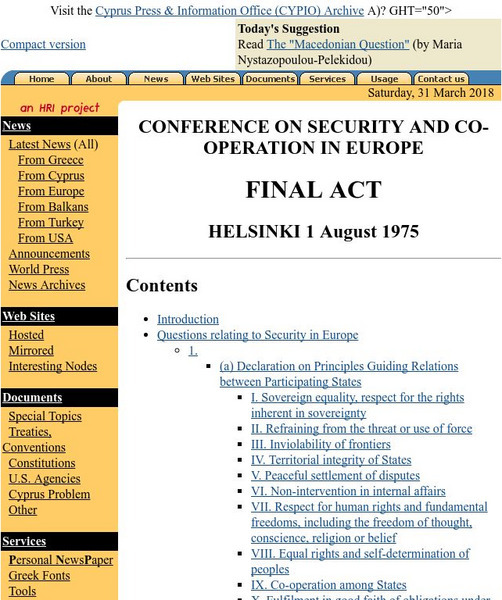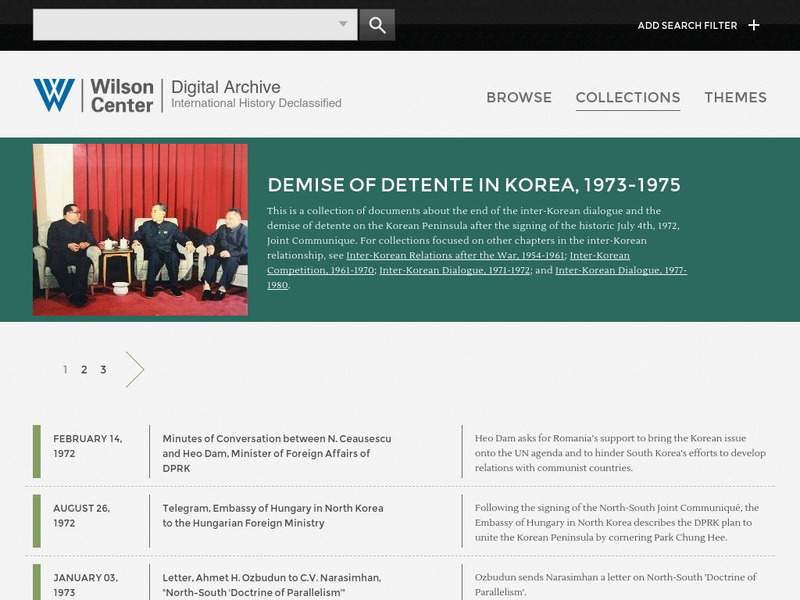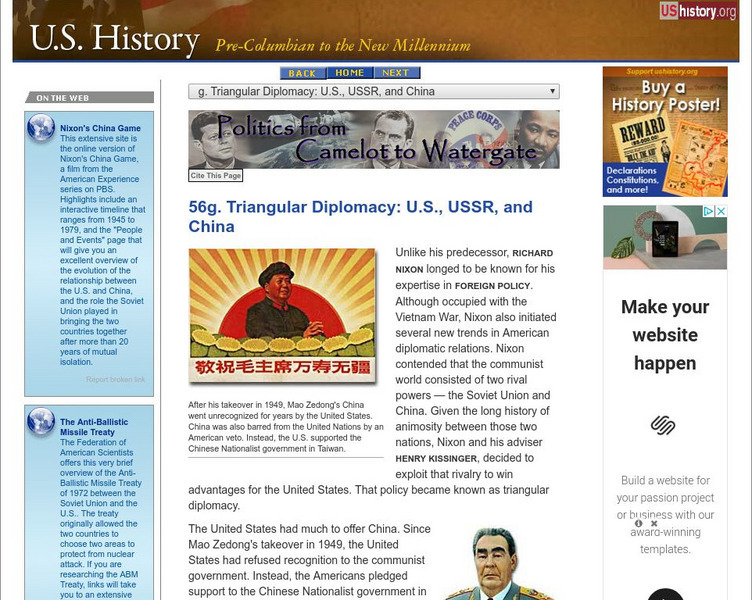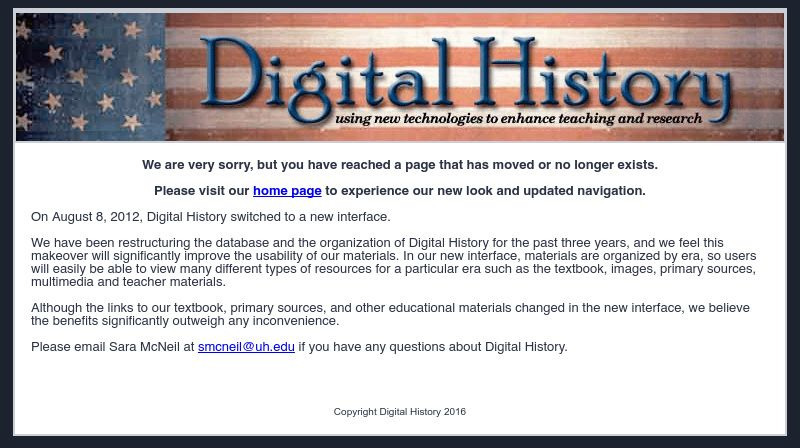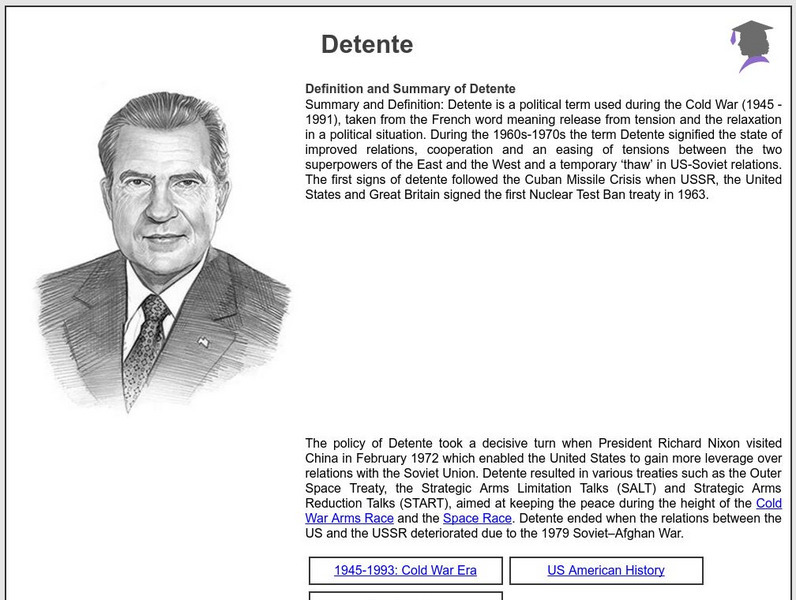North Carolina School of Science and Mathematics
Henry Kissinger and Detente
How did relations between the United States and the People's Republic of China evolve between 1950 and 1970? Your young historians will complete a timeline of events with evidence that the relationship between these two great nations was...
Curated OER
The Tet Offensive and the Vietnam War
Students comprehend how the United States became involved in what one historian called the quagmire. Students identify and analyze the importance of the Tet Offensive in turning American public opinion against the Vietnam War. Students...
Other
Hellenic Resources Network: Helsinki Final Act 1975
This primary document is a copy of the Helsinki Agreements of 1975 which recognized the borders in central and Eastern Europe that were set up since the end of WWII. They show the acceptance of the Soviet influence in Eastern Europe. and...
Other
German Embassy: Milestones in History
This site provides a timeline of milestones in German history.
Smithsonian Institution
National Portrait Gallery: The Presidency and the Cold War: Richard M. Nixon
The National Portrait Gallery explores the actions of presidents in regard to the Cold War. Read about the so-called anti-Communist warrior, Richard M. Nixon, and his opening of relations with Communist China. Watch Nixon's speech about...
Woodrow Wilson International Center for Scholars
Woodrow Wilson Center: Digital Archive: Demise of Detente in Korea, 1973 1975
This is a collection of documents about the end of the inter-Korean dialogue, and the demise of detente on the Korean Peninsula after the signing of the historic July 4th, 1972, Joint Communique.
Khan Academy
Khan Academy: Richard Nixon as President
Survey the successes and failures of the Nixon administration through a comprehensive summary, references for further study, questions for analysis, and a question/answer section from the community.
Sam Houston State University
Shsu: The Warsaw Pact
Contains a wealth of information about the Warsaw Pact. Includes information about the Soviet Alliance System, the organization of East European National units, the development of Socialist Armies in Eastern Europe, East-West diplomacy...
Country Studies US
Country Studies: Post Vietnam Foreign Policy
This site discusses U.S. foreign policy after Vietnam encompassed every corner of the globe as Presidents Ford and Carter attempted to work with countries in Eastern Europe, Latin American and the Middle East.
Other
John F. Kennedy National Security: u.s.s.r. (Pdf) [Pdf]
This article summarizes U.S.-Soviet relations during the Kennedy administration, including the Russian Missile Crisis and the Vienna Summit.
Other
Gerald R. Ford Library: Gerald R. Ford's Address to 29th u.n. General Assembly
This site is provided for by the Gerald R. Ford Library and Museum. Take a look at Ford's 1974 address to the General Assembly of the United Nations, which he delivered shortly after assuming the Presidency, and in which Ford humbly...
Other
Gerald R. Ford Library: Address to the Osce in Helsinki
Click here at the Gerald R. Ford Library & Museum to hear an audio clip or read the full text of President Ford's address to participants in the 1975 OSCE Helsinki Summit, during which the Helsinki Final Act was drafted.
Independence Hall Association
U.s. History: Tirangular Diplomacy: u.s., Ussr, and China
A discussion about Richard Nixon's foreign policies and his idea of triangular diplomacy where he used the rivalries between the USSR and China for U.S. advantage.
Digital History
Digital History: Detente
One of the most remarkable foreign policies of the 20th century, Nixon pursued detente in hopes of easing tensions with the Communist world.
Digital History
Digital History: Collapse of Communism
Overview of the collapse of communism at the end of the 1980s and early 1990s ushered in by Mikhail Gorbachev and his reforms.
Country Studies US
Country Studies: Detente
As the Vietnam War ended, President Richard Nixon's priority became pursuing better relations with the world's two largest communist superpowers, China and the Soviet Union.
Other
Temperament in Revolution Gorbachev
An excellent article about Gorbachev's appointment, goals, accomplishments, and personality.
Other
Arms Negotiations at Vladivostok
Photographs from the Vladivostok Summit in 1974 between the Soviet Union's Leonid Brezhnev and U.S. President Gerald Ford.
Other
The Helsinki Accords
A very brief explanation of the Helsinki Accords. Includes quotes from the agreement illustrating the four dimensions of the accord. Also includes three pictures of the meeting.
Smithsonian Institution
National Portrait Gallery: The Presidency and the Cold War: Jimmy Carter
The National Portrait Gallery explores the facets of presidential actions toward the Cold War. Click on Jimmy Carter to watch a short video where he expresses his support for human rights across the world. The end of the video shows the...
Siteseen
Siteseen: American Historama: Helsinki Accords
Learn about the Helsinki Accords, a series of agreements that were signed in August 1975 by leaders of the USA, the USSR, and 35 nations who were members of NATO and the Warsaw Pact that dealt with three main issues of cooperation,...
Siteseen
Siteseen: American Historama: Detente
The establishment of detente following the Cuban Missile Crisis was a period of improved relations, cooperation, and an easing of tensions between the two superpowers of the East and the West and a temporary 'thaw' in US-Soviet relations.




